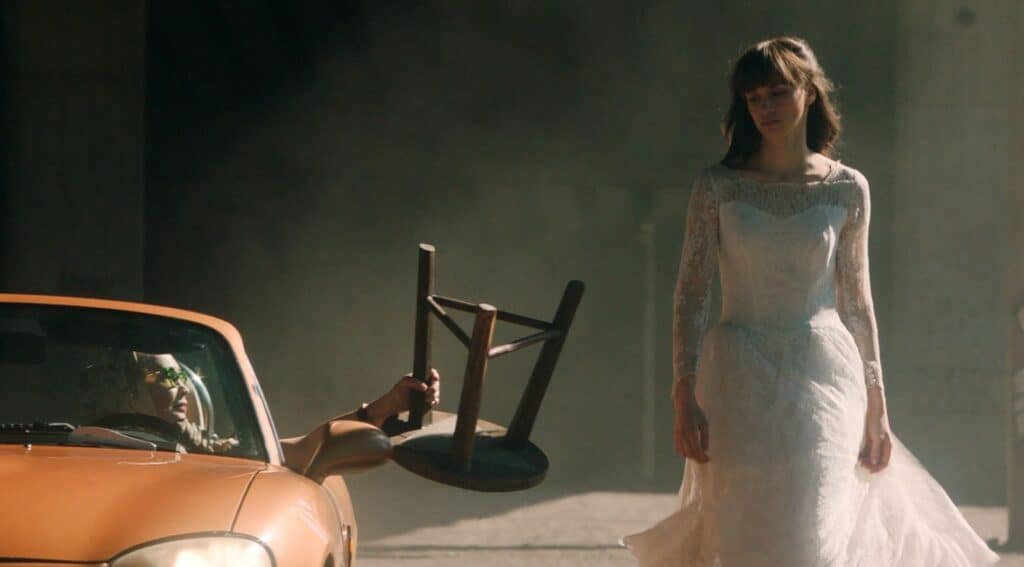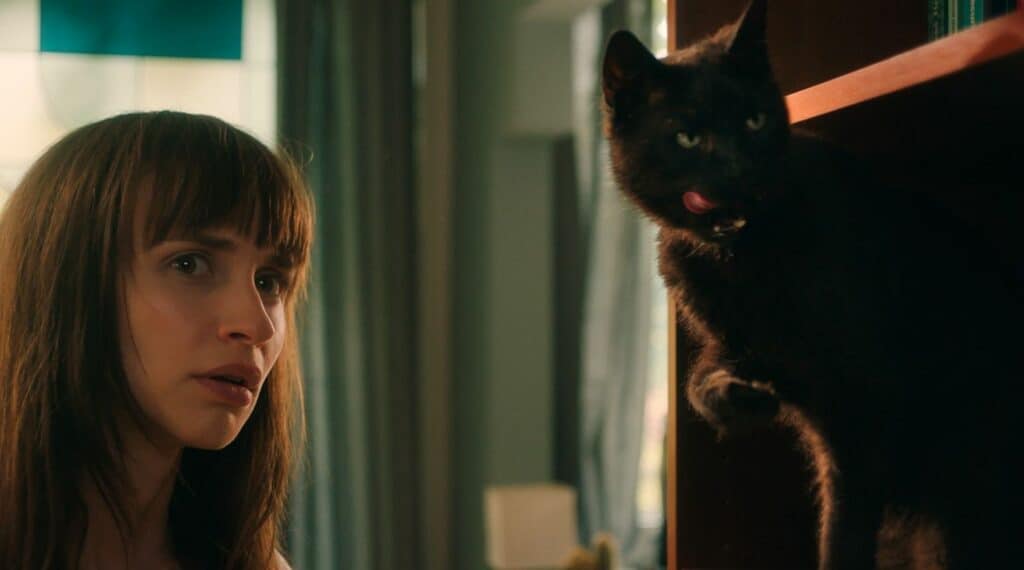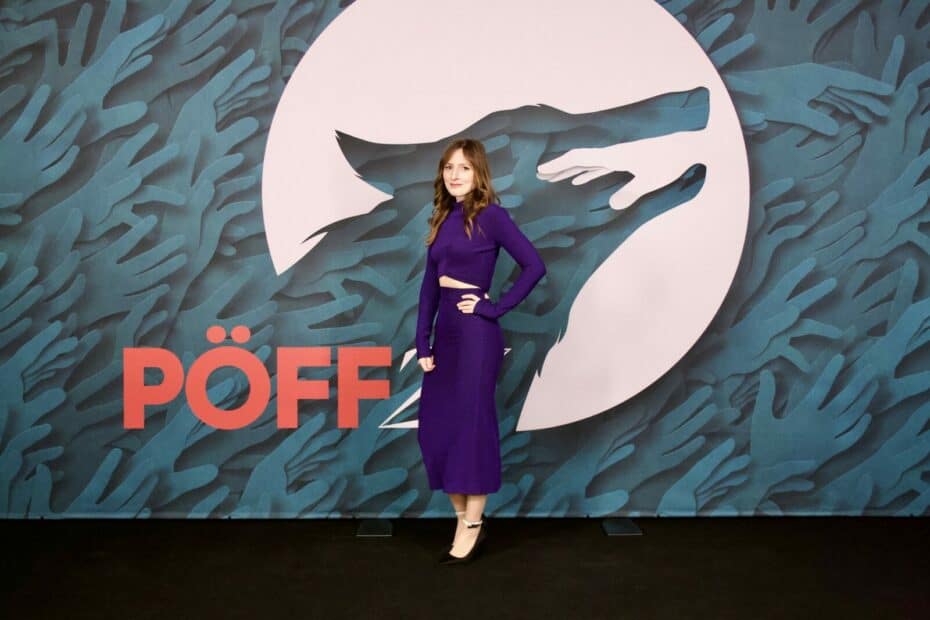I watched Cat Call (Cicaverzum), the debut feature by Rozália Szeleczki, reviewed here. After the screening at the Black Nights Film Festival, I had the pleasure of doing an interview with Rozália Szeleczki.
This is a comedic and absurd story about a woman who seems to fall in love with a cat. How did the project start?
The original idea of the talking cat came to me when I was at a friend’s house who has a cat. He was making a joke when he went to the supermarket, and I stayed with his cat for a while; he said that the cat would make a move on me. At that moment, I thought that it would be fun to have this strange love triangle. Originally, I wanted the girl to be stuck in the past without being able to move forward because of her childhood trauma. This whole thing of not being able to find love is connected to that. In that sense, it’s personal for me because I also lost my father as a child.
And then you started writing with Zsófia Kemény. What was that process like?
It was great!
She hasn’t written that much, has she?
She has novels and poems published in Hungary but no features.1 Zsófia Kemény plays a poet in Erasing Frank (Eltörölni Frankot), which was screened at the Black Nights Film Festival in 2021. ,but it was quite an inspiring experience. It was made in the incubator programme.
As was Pelican Blue and White Plastic Sky and WIthout Air.
Yes
How do you regard this film and its theme? How do you see the characters, and what is the film’s view on masculinity? The cat is male as well.
Well, I believe the whole film, in general, is quite ironic and critical but also loving. The characters might be annoying but also loveable. At least, that was my intention. I really wanted to make a film where you can also kind of take a lighthearted approach to heavy situations. It was very important for me to talk about trauma in this sort of charming way so that there is a message that you can get through these difficulties in life and even laugh about them.
Was it challenging to find the balance then, not making it too heavy or not making it too light?
Yes, it was. When it comes to genders, the main character of the cat is sort of this narcissistic, stereotypical male figure, but at the same time, these traits are not inherently or necessarily male traits, so that could be anyone.

And it could also be subjective from Fáni’s perspective, right?
Yes
Because the owner of the cat, Mihály, is actually very nice.
Yes, he is. On the other hand, you have Fáni’s work environment [in the architect’s office].
Do you think that’s because she’s a woman that she gets sidelined there, or it’s just because she doesn’t know how to handle things?
Well, according to the film, it’s both.
Exactly.
There is this sort of stereotypical, ironically pictured toxic male masculinity in the film., but personally, I feel that these terms, toxic and narcissistic, are overused. At the same time, if you would say toxic femininity, people would be like, “Oh my God, how can you say that? It’s so rude”, so I don’t know why it is ok to talk about men in that way.
As you say, it’s overused and comes automatically. Someone says “toxic masculinity,” and the discussion is over.
The film is a parody of the whole situation. It’s quite clear that this is not realistic; it’s really exaggerated.
Still, her trauma is real, and it impacts her life.
Yes, but I mean, the whole world she’s living in is sort of this fairytale-like reality, and it reflects on her inner world since she is stuck in her imaginative world. Maybe those guys are not so toxic; maybe it is just her subjective experience.
Would you call this a romantic comedy, or do you think it’s simplistic terminology?
I do think it’s very simplistic, and I wouldn’t call it a romantic comedy. I think this is an author-driven drama story implemented in a romantic comedy form.
I use that term for some Hungarian films, and the point for me is that rom-coms can be intelligent and daring and not necessarily what we see in American films. I talk about Liza, the Fox-Fairy as a rom-com. I thought a lot about that film while watching Cat Call. Would you agree that the films are similar?
I heard that a lot. People have the need to find references…
Especially people like me.
Yes (laughing), but actually, for me, that film was not a reference; that’s rather a coincidence. For me, the films are not that similar, even though some themes and elements are connected. Maybe it sounds weird, but one of the main references was Bridget Jones’s.Diary (2001).
I haven’t seen that, actually.
Really? Another reference would be Amélie in the way she is, like in her own world.
I think that many Hungarian rom-coms, even the commercial ones, often have a twist or bite to them that elevates the genre above the clichés. Films like Poligamy (2009) and Just Sex and Nothing Else (2005). Like the dialogue in Krisztina Goda’s film.
(Laughing) It’s funny that you’ve seen those Hungarian films but haven’t seen Bridget Jones.
Well, it’s not Hungarian.
I thought that foreigners know Béla Tarr and others like that, but that a film like Just Sex and Nothing Else was mostly known in Hungary, but I like that film.

Would you agree that Hungarian films, even the most commercial ones, have something a bit edgy about them? That’s why I use the word rom-com.
Well, there are films that don’t have any twists or anything special, but maybe you don’t hear about them.
Yes, like S.O.S. szerelem! (2007), but it still had something different.
Interesting, I never thought of it this way, but I am personally interested in merging genres and auteur cinema.
You mentioned Fáni’s inner world, which brings us to the film’s style. Let’s talk about the cinematography, and then I will get back to the production design.
Making the film look good with such a low budget was difficult. The cinematographer, Kristóf Deak, worked closely with the production designer. Pater Sparrow…
I wanted to get to him. I love his film 1.
So, we were working together closely also with Juli Szlávik, the costume designer, to find elements, so the world that we see is sort of almost normal, but there is always something twisted or magical, but not everything because we didn’t have money for that. I was looking at architecture in Mexico, and I was amazed at those colours and also those round-shaped windows. And I found a picture on Pinterest and sent it to Zoli.2 Pater Sparrow’s real name is Zoltán Verebes. The last name means sparrow in Hungarian. Then, we started to look for locations that would have that look. We found a building, and Zoli had the idea of putting vinyl stickers on the window.
It was a real apartment? It wasn’t a set?
It was an actual apartment, and we attached those stickers to the window and made it look like stained glass. That was surprisingly expensive, so we had to save on other things. We still think it was worth it because that really gave the whole look of Mihály and Fáni’s apartments. It was similar with the cinematography: We were always picking certain elements to capture Fáni in a dreamy atmosphere, but there were other scenes that were shown more realistically, like the office scenes.
There is a harsher environment there, cinematically. Talking about Fáni, how did you work with Franciska Törőcsik?
She already starred in one of my short films (Mrs Rozgonyi 2018), and I thought that she had this sort of humour in her, which hadn’t been shown in the films she had made so far, so I wanted to bring that out. I thought Cat Call would be an opportunity to bring that out. We became friends after the short and worked closely on this film. We went through the script together.
Did she have some impact on the script?
She had some impact, but generally, I’m quite open to feedback from the actors.
Even on the set?
Well, not necessarily, but if someone wants to say something, I listen.
You listen, but then you do it your own way anyway?
Yes! (laughing).
The film opened in October in Hungary. How were the reviews?
They were quite mixed. Some people were really triggered by the film, both in good and bad ways. Some are really touched by the film, and others don’t respond to it.
.
